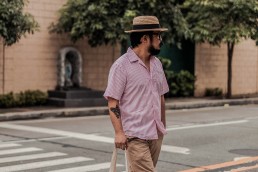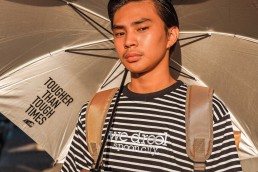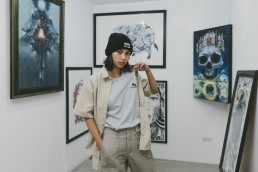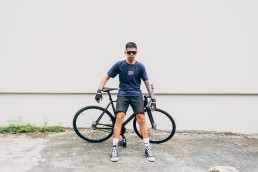
Live for twenty years or so and you feel that the passage of time occurs in cycles. Pandemics come, go, and then come back again. Markets boom and bust. Fashion trends arise, fade away, and then resurrect into ubiquity once more. There must be a segment in the brain that manufactures nostalgia—a longing for the past. Perhaps this same segment urges us to long for escape, fantasy, an earlier point on the cycle—further nourished by movies, fashions, and media that scratch the itch.
For over 76,000 people—myself included—New Jersey-based menswear blogger and content creator Denny Balmaceda is one of the influences that helps scratch that itch. Denny describes his style as that of a movie character. I corroborate that. He could be running down the street wielding a katana as if headed into battle, and rather than trying to wander away I’d stop to watch. “It’s probably for a movie,” I’d think.
Denny’s looks evoke feelings of a golden age at least twenty years ago—one of flared and pleated pants, leather boots, cowboy hats, delicious and vibrant colors accented with streetwear flare—Dunks, NBA jerseys, trucker hats. You could try to boil down the looks until kingdom come, but the remains at the bottom of the pan wouldn’t resemble anything.
Denny, sitting in his sunny New Jersey apartment, a literal stone’s throw away from where he created his first ever blog post, says it best. “I don’t label myself as someone who just does high-end stuff [or] someone who just does low-end stuff. I’m just me. I’m not just someone who only does suiting, someone who does runway, or street wear. I’m everything. My style is everything.”

In the online menswear space, Denny is an OG
Nowadays, Denny’s time is spent in the business of fashion 24/7—managing his online presence, directing social media for streetwear and vintage brand See/Know, and working on projects with fashion brands like Gucci and Saks. He also co-owns thrift store Double Team Vintage with one of his best friends, Marco Vidal. It stumps both him and me to think that not all that long ago in 2007 Denny was just getting his diary of daily outfits together.
Then working at a Filipino travel agency, Denny would use his lunch breaks and digital camera to catch his looks for the day. “[This was] at a time where no one was really doing that,” says Denny, “So when people will walk by you they would just be like, ‘What are you doing? Some people would be really interested. Some people would be confused, but now it’s so common.” Denny continues, “[Now] you walk around the city of New York, SOHO, [and] everyone [on] every block is doing photo shoots. Models, real people, influencers, everyone. It’s just a common thing.”
Back in the day, Denny would prop his camera up on the ground to catch his look and then edit it on Microsoft Paint. “Remember [Microsoft] Paint? Denny laughs. It all sounds so grainy and arduous—at least now in a world that’s expected to capture such high-quality content on our ever-present phones—but if Denny lacked the tools at the time, you wouldn’t have known.
Scraping every ounce of his experience together and working with all the hustle characteristic of immigrant mentality, Denny worked his way from posting his looks on Facebook Albums to making a massive dent on fashion inspiration site Lookbook.
“Everything that has happened to me in my life from being undocumented, [an] immigrant, not being able to attend college, working quirky jobs under the table like a video store clerk, thrift store and flea market worker, travel agent and vintage shop floor manager all shaped up who I have become as a person as well as a creative,” says Denny.
“Everything about me is a mixture of all those experiences.”
Keep in mind: it was a different world back then
Instagram went live in 2010, and in doing so eventually created a whole slew of jobs which just over ten years ago weren’t even fathomed: influencer, digital marketer, and influencer agent. For many, this has created not only an opportunity, but incredible amounts of pressure too. “If you start now, it’s a little harder,” says Denny, “Because your mentality is like, ‘Well, I gotta make money out of this. I ‘gotta get big, I gotta be popular. I gotta be famous.’”
Denny’s time spent riding the tide of the then-nascent online space was less concerned about that and was focused totally on being creative, on showcasing his looks, and building a community. The opportunities which now function as a source of pressure to would-be online personalities simply weren’t there.
Nor were there blueprints to follow.
“I always tried to stay in my own lane, and I tried not to get inspired by others because I want to discover things on my own,” says Denny. It was this sort of mentality that helped Denny carve out his own online niche, but it’s a mentality that fuels his creative process until today. “It’s hard. No one’s original in this world anymore. That’s why I want to just discover things on my own,” says Denny.
“You realize that everyone has the same state of mind when it comes to being creative. We’re all inspired by each other without knowing that we’re inspired by each other.”

Denny’s niche grew
Growing up as a kid who enjoyed painting and drawing, Denny came to identify as a cinephile (his much-watch movies by your twenties are below), and these colourful longings bridged with a mindset of finding unique and affordble gems generate a massive interest in vintage clothing. “Back then I was more about like, ‘Oh look, this thing’s cheap. I can put this here and make a look out of it and mimic a runway look,’” says Denny. It makes sense that his blog at the time was called Look Rich Shop Cheap.
Denny comments that this, being a decade ago, wasn’t a time where vintage shopping was perceived as cool unlike nowadays. But perhaps that only contributed to the substance that has drawn such an audience to Denny. He preached what thrifting clothing taught him: to care less about name brands but more about the way pieces looked.
And this study in shapes, silhouettes, colors, and patterns still reflects on Denny’s Instagram, with followers being implored not to look at where the clothes are from but how they’re arranged, how they’re given new life, how they tell a story—a story that’s uniquely its own and a story that belongs only to its wearer.
Denny’s story was one of sharing content for free for five years, but soon Denny was being approached by brands and an influencer agency. “It was around 2015 to 2016, where that [going full time] happened because brands just kept rolling in then an influencer agency signed me.”
He had gone from repping the shirts of up-and-coming designers on Instagram to his first paid gig with—of all brands to start—Nike. “My first big paid gig was Nike, which is so cool,” Denny recalls. “It [was] their 30th anniversary of Air Force Ones. They invited me to the city, and they just took photos of me.”

Denny the brand, the cult classic and not the blockbuster
Denny worked with the influencer agency for three years and made some material changes to his online presence. He dropped “Look Rich Shop Cheap” in favor of simply “Denny Balmaceda” as few brands would want to associate themselves with the word cheap. It was a business decision on Denny’s part.
Reflecting on his time with the agency, Denny says, “I’m a believer [that] things happen because better things are meant to and [that] things are happening because they are things you will eventually use as a tool in the future to better yourself.”

Denny doesn’t pile into details on metrics and engagement, nor does he meticulously pore over how his posts are performing—and that’s not because he doesn’t care. He’s simply just calm and sure of his online product. “I have a lot of friends who just stopped completely because they cared so much about the metrics,” says Denny. “Not me. Nah, I don’t care. I’m a creative first. I like sharing my creations and I like sharing my looks. I like sharing my projects.”
He would soon pick projects that make him feel a whole sense of integrity rather than those which pay a lot—and regardless of how well these perform in terms of metrics. “A lot of my stuff that doesn’t do well for the [bulk of people] led me to bigger things,” says Denny. “Like the thing I’m doing for Vogue Philippines where ‘they interviewed me was just something that I did for free for Gucci because they were like, ‘Hey, we really like your style, will you be a part of this?’”
“I think I am more of a cult classic film than a blockbuster movie,” says Denny. “I don’t want to be this movie that everyone gives a like. I want to be someone that has integrity and that people remember and people still talk about from time to time.”
Fashion first
Denny’s starting point, of a creative without a big platform, without the monetary opportunity awaiting through an online community, has given him the stamina and maturity to keep up the creative work. The motivation comes from within.
It is from this same standpoint as someone that puts creative work first that Denny shapes his online personality. “People could see when something is like an ad and people could see when something is genuine, and people can see when something is a genuine ad and people appreciate stuff like that,” says Denny.
And in an online world, there are expectations on people with influence to be for x, y, and z, causes. Denny most certainly is, but he recognizes that his spot under the sun is in fashion, not in trying to throw weight behind the latest thing to hit the news.
He shares, “I don’t really put a lot of my personal thoughts on my feed because what people follow me for is fashion. [If people] want to talk to me about personal stuff, [they] could DM me or you can talk to me on the side, but like I’m not going to debate you on my own page about topics that don’t relate to fashion.”
And though we chat about the importance of the representation of people of color in fashion and other ongoing issues, these aren’t the pieces of news that Denny wants to bring up to the community he’s curated. The place for that is in the real world, where Denny was part of the original group talking about the lack of POC representation in their community while championing Filipino pride.
“[The page is] fashion first,” says Denny, “And like I said if you want to talk to me about other things, we could talk about it on the side.”

What’s next?
In finance there’s this idea that you “graduate” from the buy-side (analyzing companies and making models) to the sell-side (brokering investments), but the roadmap for an influencer isn’t quite as clear.
On the topic of what the future holds, Denny answers with a certain sense of smooth candidness, “I just go with the flow and see where it takes me to be honest,” he says. “I just hope I am still killing it and doing what I love everyday.”

But with some prodding, Denny shares that he’s headed more in the direction of being the man behind the scenes and giving creative direction. “I think that’s the right trajectory,” he shares, “Because I can’t always be, you know, I don’t want to always be the person in front of the camera. I like what I’m doing now where it’s a balance of both.”
Denny then shares all the paths he could be working in, all the projects he could be doing like directing, starting an agency, perhaps directing a short film. There’s no assurance, but he’s certainly calm—perhaps a role model for creatives trying to make it in a very fast moving world.
Denny didn’t need a blueprint because, frankly, none existed at the time, but for many creative people, Denny’s story is also a short history of his profession. It’s a difficult one. It may look fun from the POV of someone stuck at work and scrolling through Instagram, but to build the presence Denny has means constantly being at work.
“It’s hard for me. My girlfriend would always be like, ‘Can you just focus?’ I’m always just thinking about creative stuff or what to do and what to do next.”
And at the end of the day, you’re implored to remain gracious
Denny’s favorite pages are those maintained by non-influencer people who are just trying to be creative to nourish their own souls rather than to attract brands. “It just feels so real to me,” he shares. And that’s because behind all the wonderful fabrics, shoes, and photoshoots, Denny is a man with a beating heart, a creative mind, and somewhere in him a solid rock of integrity. The best thing is that it’s all he wants you to see.
“I don’t need you to see me as some super cool or super grand [guy] or whatever. I just need you to see me as a real person who happened to make it in this world and I want you to be inspired, but then just to see yourself as a person that could just make it if you really believe in yourself and just stay consistent and just, you know, be nice, be humble.”
“Don’t develop an ego because ego will break you. Also, don’t care so much about what other people think. Don’t care about the engagement and the metrics and all these things [because] at the end of the day, if you’re creative, be creative.”

CREDITS
WRITER Jaymes Shrimski
PHOTOGRAPHER Nikki Ruiz
EDITOR Tricia Quintero
SUPPORT PURVEYR
If you like this story and would love to read more like it, we hope you can support us for as low as ₱100. This will help us continue what we do and feature more Filipinos who create. You can subscribe to the fund or send us a tip.







